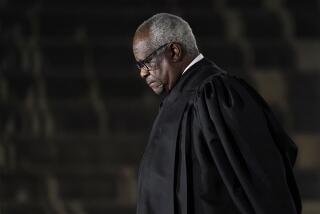Rite Aid Ex-Exec’s Generosity Detailed
- Share via
HARRISBURG, Pa. — Former Rite Aid Corp. chief counsel Franklin C. Brown, on trial for conspiracy and fraud charges, often used his own money to reward subordinates or help friends out of financial jams, some beneficiaries of Brown’s generosity testified Monday.
Brown’s lawyers indicated that they may call additional witnesses this morning, but U.S. District Judge Sylvia H. Rambo ended Monday’s proceeding at midday and advised jurors they may hear closing arguments and begin their deliberations today.
The defense sought to counter nine days of prosecution testimony about Brown’s alleged role in orchestrating backdated, bogus compensation letters worth millions to himself and other former senior executives; conspiring to inflate income at the nation’s No. 3 drugstore chain in the late 1990s; and trying to mislead investigators.
His attorneys say Brown was a zealous company lawyer but did not break the law.
Rambo rejected a defense motion to dismiss the 11 charges pending against Brown, said one of his lawyers, Joseph U. Metz.
Brown, 75, listened intently to the testimony of three former co-workers and two friends. The rest of the courthouse was closed for the Columbus Day holiday.
Among the defense witnesses was I. Lawrence Gelman, a Rite Aid lawyer whom Brown hired in 1978.
He told how Brown promised him a company car and ultimately kept his word by writing him a personal check to buy one after then-Chairman and Chief Executive Alex Grass would not authorize the purchase.
Grass, who founded Rite Aid, “didn’t believe that lawyers warranted a company car,” said Gelman, who is currently Rite Aid’s vice president for real estate and who was forced to testify under a subpoena.
In March 1999, also after Grass rejected the expenditures from company accounts, Brown wrote three checks totaling $20,000 as bonuses for three Rite Aid lawyers to reward them for their work on the acquisition of about 400 store sites, testified Alan Garubba, one of the lawyers.
Dr. Teresa Lee Smith, a Michigan neurologist who attended medical school with Brown’s daughter, said Brown helped get her career back on track after mounting debt forced her to cut short her residency in her medical specialty.
She quit the residency at the University of Virginia and had taken a job with the Texas Department of Corrections when Brown gave her a $160,000 interest-free loan so she could pay off her student loans and resume her residency training. She received the loan with the understanding that she would repay it when she could afford to.
As a result of the alleged accounting fraud at Rite Aid, the company was forced to retroactively reduce its earnings by $1.6 billion in July 2000.
Besides former CEO Martin Grass, the son of Alex Grass, five other former high-ranking Rite Aid executives have pleaded guilty to federal charges related to the investigation and await sentencing in the case.
More to Read
Inside the business of entertainment
The Wide Shot brings you news, analysis and insights on everything from streaming wars to production — and what it all means for the future.
You may occasionally receive promotional content from the Los Angeles Times.










